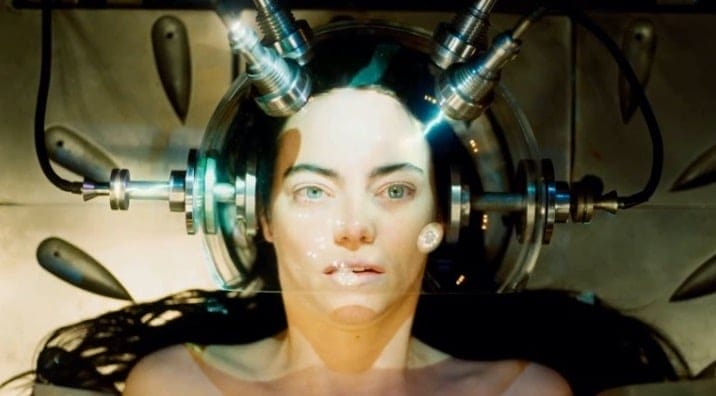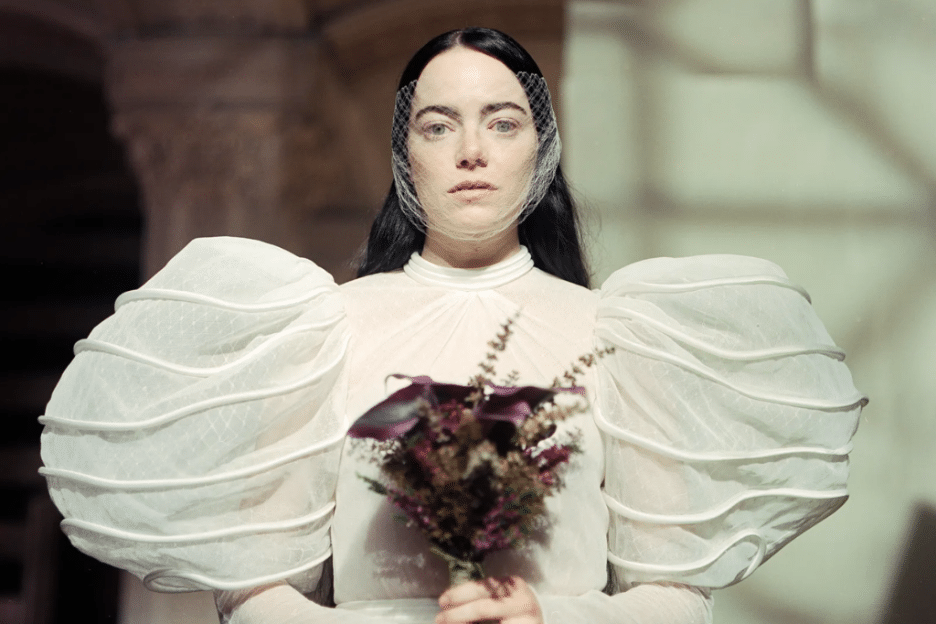Seventy-two years ago, Disney’s animated Alice in Wonderland walked away from the twenty-fourth Academy Awards empty-handed after composer Oliver Wallace lost to Johnny Green and Saul Chaplin (An American in Paris) for what was then called Best Scoring of a Musical Picture. In 2011 Tim Burton’s Alice adaptation took home statuettes for Best Art Direction (Robert Stromberg and Karen O’Hara) and Best Costume Design (Colleen Atwood) having also scored a nomination for Best Visual Effects. This Sunday, Alice will again be attending the Oscars. But in true Wonderland fashion, she’ll be in disguise as Emma Stone’s intrepid heroine Bella Baxter from Yorgos Lanthimos’ surreal masterpiece, Poor Things. Widely regarded as one of best films of the years, Poor Things is nominated for 11 Academy Awards (Best Picture, Best Director, and Best Actress) and has already won five BAFTAs and two Golden Globes amongst a host of other awards. While the film is not an Alice adaptation, nor does it reference Lewis Carroll’s novel, but Lanthimos’ construction of the world of Poor Things and Bella’s character arc are classic Alice’s Adventures in Wonderland, an odyssey of self-discovery through a strange yet beautiful world.
Poor Things begins as Bella Baxter ends (the first time). The eccentric (some might say mad) doctor and scientist Godwin Baxter (the sublime Willem Defoe) saves Bella’s life by transplanting the still-living brain of her unborn fetus after jumping off a bridge. As a result, Bella begins the film with the intellectual and emotional maturity of an infant. She rapidly matures, however, transitioning to a teenage mindset throughout the first act, discovering sexual pleasure and masturbation. Her world continues to broaden when she meets Max McCandles (Ramy Youssef), her father’s assistant. McCandles swiftly falls for Bella and she accepts his marriage proposal. But Bella’s curiosity for the outside world and thirst for sexual exploration leads her to run off with her father’s debauched, scoundrel of lawyer, Duncan Wedderburn (the delightfully outrageous Mark Ruffalo). What follows is a coming-of-age epic equal parts sensual, troubling, and enlightening.

So what does this have to do with Alice in Wonderland? Well, it can (and will) be argued that Bella is an Alice avatar, that Poor Things is an adult version of Alice’s Adventures in Wonderland. Alice’s journey is one of self-discovery, in which her journey through a strange, seemingly arbitrary world informs how she defines herself. When the Caterpillar asks Alice who she is, Alice replies, “I-I hardly know, Sir, just at present - at least I know who I was when I got up this morning, but I think I must have changed several times since then.”
Alice feeling like she has gone through rapid change mirrors Bella’s arc over the course of Poor Things. Bella rushes through her emotional development, going from an infant to an emotional mature adult in the span of about a year. Just as Alice feels anxious about her sudden changes, Bella also experiences intense shock at certain points throughout her journey. One pivotal experience comes when the cruise ship on which Bella and Duncan are traveling stops at Alexandria, Egypt. Bella disembarks and is horrified to witness the intense suffering of the city’s indigent.

Prior to this experience, Bella had been sheltered. Whether confined to the twisted yet familiar environs of Godwin’s home or ensconced in the variety of sensual pleasures offered by Libson hotels and Mediterranean cruise ships during her galavanting with Duncan, Bella had never experienced, much less seen, true suffering. This revelation is devastating and causes Bella to experience an existential crisis, questioning everything she’d ever been told. Her distress and inexperience with the “real world” leads her to make the impulsive decision to give the ship’s crew Duncan’s money, who falsely promise to use it to support the poor of Alexandria. This has disastrous consequences on Bella and Duncan, leaving them penniless and stranded in Marseille. Yet the experience causes Bella to grow, giving her a more realistic view of people and morality.
One of the common beliefs about Alice’s Adventures in Wonderland is that it is a pure nonsense tale in which Alice breezes from one surreal episode to the next until she wakes up back in Oxford, her odyssey in Wonderland ostensibly just a dream. Yet Alice does undergo a change throughout her story. At the Knave of Hearts’ trial, Alice becomes more confident in herself, criticizing the arbitrary nature of the inquest and standing up for herself in front of the Queen of Hearts. Alice’s experiences in Wonderland did change her. Alice needed to be independent and think for herself in order to navigate that wild world and those lessons prepared her to confront the tyrannical Queen at the end of the story.

Similarly, Bella’s experiences with Duncan, in Alexandria, and in her time as a sex worker in Marseille prepared her to confront her ex-husband, the sadistic General Alfie Blessington. Blessington was the reason for Bella’s suicide in her previous life, his cruelty and controlling nature driving her to jump into the Thames rather than let her and her child suffer under his tyranny. But by the end of the film Bella has developed a strong sense of her own independence and competency, leading her to exact revenge on her former tormentor. It is a powerful moment, showing how the lessons imparted struggle can lead to triumph.
The world’s of Alice’s Adventures in Wonderland and Poor Things also perform similar functions in relation to their protagonists. With both stories initially set in Victorian England, their secondary worlds provide a juxtaposition of customs and rules to the protagonists’ primary worlds. Carroll’s Wonderland is a surreal dreamworld characterized by non-existent rules and ever-changing properties. It is designed to confuse and frustrate Alice’s preconceived notions. Lanthimos’ world is not a fictional realm, it is a twisted version of our world, yet operates as Wonderland due to Bella’s unfamiliarity. The fantastical steampunk aesthetic reflects Bella’s point of view as she moves through a world filled with strange customs and confusing behavior. Both Alice and Bella have unreliable guides. Alice’s include the White Rabbit, the Caterpillar, and Cheshire Cat, while Bella must navigate the ulterior motives of Duncan and Madame Swiney in order to extract value from their examples. For both characters, their “Wonderlands” function as teachers, interacting with them so they can grow and change.

While not overtly influenced by Alice’s Adventures in Wonderland, Poor Things’ narrative and protagonist certainly share Alice-ean functions and characteristics. Bella’s odyssey of self-discovery through Yorgos Lanthimos’ beautifully crafted world thematically mirrors Alice’s own journey through Wonderland, with both experiences inspiring the characters to grow, becoming more self-confident and self-assured than their former selves. Alice may not be on stage this Sunday at the Dolby Theatre nor may she be thanked if Poor Things captures any gold statuettes, but, nevertheless, the film owes a debt to the type of fantastical coming-of-age story that Alice’s Adventures in Wonderland helped popularize.

An itinerant storyteller, John Drain attended the University of Edinburgh before studying film at DePaul University in Chicago and later earned an MFA in Screenwriting from the American Film Institute Conservatory. John focuses on writing mysteries and thrillers featuring characters who are thrown into the deep end of the pool and struggle to just keep their heads above water. His work has been recognized by the Academy Nicholls Fellowship, the Austin Film Festival, ScreenCraft, Cinestory, and the Montreal Independent Film Festival. In a previous life, John created and produced theme park attractions across the globe for a wide variety of audiences. John keeps busy in his spare time with three Dungeons and Dragons campaigns and a seemingly never-ending stack of medieval history books.